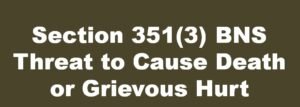351(3) BNS | Section 351(3) of BNS | Bail

351(3) BNS
The Section 351(3) BNS speaks that whoever commits the offence of criminal intimidation by threatening to cause death or grievous hurt. The Trial Court may award imprisonment which may be extended to seven years or with fine or with both.
Section 351(3) of Bharatiya Nyaya Sanhita, 2023
The Section 351(3) of Bharatiya Nyaya Sanhita, 2023 also talks about the criminal intimidation by threatening to cause destruction of any property by fire or to cause an offence punishable with death or imprisonment for life or an offence with imprisonment for a term of seven years.
Ingredients of 351 (3) BNS
The ingredients of Section 351(3) BNS are as follows :-
(a) Criminal intimidation: The accused must have intention to cause alarm to the victim.
(b) Threatening another person: The accused must threaten the victim’s person, reputation, or property.
(c) Intentional insult: The accused must have the intention to harm the victim.
(d) Coercion: The accused must force the victim to perform or refrain from performing an act against their will.
In absence of basic ingredients of the section in the complaint, the trial court cannot sustain the charges framed under section 351(3) BNS. Many person ask that BNS 106 may also invite 351(3) BNS with it or not ?
351(3) BNS Bailable or not
The offence registered under Section 351(3) BNS is Non-cognizable and bailable offence.
The maximum punishment for Section 351(3) BNS is seven years imprisonment, or fine, or both.
A Magistrate of the First Class can conduct the trial of the this offence.
Supreme Court Case Laws on 351(3) BNS
Where a person entered the victim's house during midnight armed with a knife and threatened with death anyone who came between himself and the victim, the offence under this section was held to have been made out.
Case Reference: Ghanshyam v State of MP, 1990 Cr LJ 1017 (MP)
The threat must be real in the sense that the accused means what he says and the victim of the threat should feel threatened actually.
Case Reference : Noble Mohandas v State of TN, 1989 Cr LJ 669 (Mad)
Where the accused made his outburst on a public servant when he was on the way to attend his office saying that he was going to kill him, it was held that it was sufficient to hold that the act will fall under section.
Case Reference: Rajendra Datt v State of Haryana, 1993 Cr LJ 1025 (P&H)
In order to attract the ingredients of section, the intention of the accused must be to cause alarm to the victim. Mere expression of words, without any intention to cause alarm, would not suffice.
Case Reference: Tammineedi Bhaskara Rao v State of AP, 2007 Cr LJ 1204 (AP)
Frequently Asked Questions & Answers
Question: If someone threats to kill or cause grievous injury, what should I do?
Answer: You should examine the threats are just mere words or having any intension also. If you assured that there is intention behind the words used. You should file compliant to the nearest police station.
Question: Can I file online compliant in this regard?
Answer: Yes, anyone can file online police complaint but within 2-3 days you have to submit the hard copy of the complaint to the police station.
Question: Opposite Party have just use words in anger but no intention to kill or cause grievous injury. What are the chances of conviction?
Answer: Conviction of any crime is completely depend on the evidence. However, mere expression of words, without any intention to cause alarm, would not suffice.
Question: What is the essential element for this offence of 351(3) BNS ?
Answer: Intention behind committing offence is essential element for this office.
Question: 351(3) BNS is bailable but non-bailable offence?
Answer: 351(3) BNS is bailable offence.
Question: What is remedy against registration of false FIR against me?
Answer: If the complaint is false and having no substance, Accused can filed a petition before High Court for quashing of the false FIR.
Question: Can I apply anticipatory bail?
Answer: Since, this is bailable offence; during police investigation, they will release on on your bail bond. Police may not arrest you or may call you to remain present before Magistrate on the date of filing of charge sheet.
If anyone face any false criminal proceedings, then he can approach to High Court for quashing of FIR through criminal lawyer deal criminal matters.
